
The Dilwara Temples or Delvada Temples are a group of Śvētāmbara Jain temples located about 2+1⁄2 kilometres from the Mount Abu settlement in Sirohi District, Rajasthan's only hill station. The earliest were built by Bhima I and supposedly designed or at least financed by Vastupala, Jain minister of Dholka. They date between the 11th and 16th centuries, forming some of the most famous monuments in the style of Māru-Gurjara architecture, famous for their use of a very pure white marble and intricate marble carvings. They are managed by Seth Shri Kalyanji Anandji Pedhi, Sirohi and are a pilgrimage place for Jains, and a significant general tourist attraction. The Dilwara temples are regarded as the most impressive among Jain temples in Rajasthan.

Shikharji, also known as Sammet or Sammed Shikharji, is one of the Holiest pilgrimage sites for Jains, in Giridih district, Jharkhand. It is located on Parasnath hill, the highest mountain in the state of Jharkhand. It is the most important Jain Tirtha, for it is the place where twenty of the twenty-four Jain tirthankaras along with many other monks attained Moksha. It is one of the five principal pilgrimage destinations along with Girnar, Pawapuri, Champapuri, Dilwara, Palitana and Ashtapad Kailash.
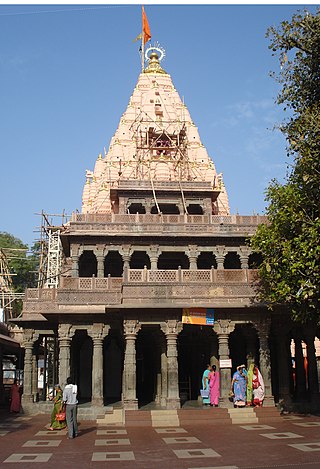
Mahakaleshwar Jyotirlinga is a Hindu temple dedicated to Shiva and is one of the twelve Jyotirlingas, shrines which are said to be the most sacred abodes of Shiva. It is located in the ancient city of Ujjain in the state of Madhya Pradesh, India. The temple is situated on the side of the holy river Shipra. The presiding deity, Shiva in the lingam form is believed to be Swayambhu, deriving currents of power (Shakti) from within itself as against the other images and lingams that are ritually established and invested with mantra-shakti.
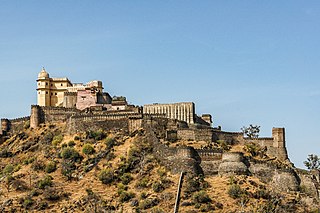
Kumbhalgarh, also known as the Great Wall of India, is a fortress on the westerly range of Aravalli Hills in the Rajsamand district of the Rajasthan state in India. Situated approximately 84 km (52 mi) from Udaipur, it was built during the 15th century by Rana Kumbha. The wall of Kumbhalgarh is one of the longest continuous walls in the world, spanning 38 kilometers. It is also the birthplace of great king and military leader Maharana Pratap of Mewar.
Gogunda is a town and tehsil headquarters of Gogunda Tehsil in Udaipur district, located about 35 km (22 mi) in north-west from Udaipur city in the Indian state of Rajasthan. It is situated on a high mountain in Aravalli hills and is reached by crossing a difficult mountain pass.

Rajsamand District is a district of the state of Rajasthan in western India. The city of Rajsamand is the district headquarters. The district was constituted on 10 April 1991 from Udaipur district by carving out 7 tehsils - Bhim, Deogarh, Amet, Kumbhalgarh, Rajsamand, Nathdwara, and Railmagra.

Padampura or Bada Padampura is a Jain temple in Shivdaspura town in Jaipur district of Rajasthan. It is located at a distance of 35 km from Jaipur on Jaipur-Kota road.
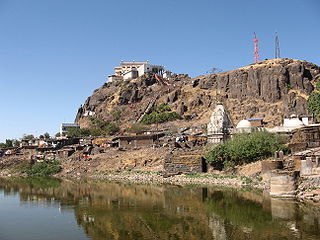
Pavagadh is a municipal operated region in Panchmahal district about 46 kilometres (29 mi) away from Vadodara in Gujarat state in western India. It is known for a famous Mahakali temple which is one of the 51 Shaktipeeths and draws thousands of pilgrims every day. However, as per records, this was originally a Jain temple belonging to the Svetambara Achalgaccha, whose Adhistayika Mahakali's idol was installed here in the 12th century. This locality Champaner-Pavagadh Archaeological Park was declared by UNESCO as a World Heritage Site in 2004.

A Jain temple, Derasar or Basadi is the place of worship for Jains, the followers of Jainism. Jain architecture is essentially restricted to temples and monasteries, and Jain buildings generally reflect the prevailing style of the place and time they were built.
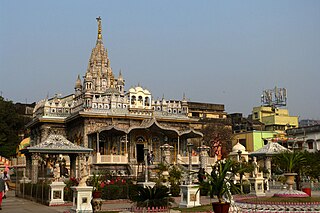
Calcutta Jain Temple is a Jain temple at Badridas Temple Street, Gouribari in Maniktala and a major tourist attraction of Kolkata (Calcutta), India. The temple was built by a Jain named Rai Badridas Bahadoor Mookim in 1867. Pratishtha was done by Sri Kalyansurishwarji Maharaj.
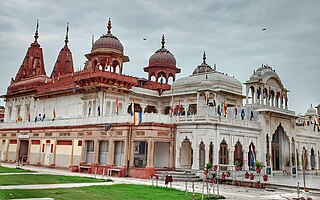
Shri Mahavir Ji is an important and prominent Jain pilgrimage site situated in Shri Mahaveerji town in Hindaun Block, Karauli district in Rajasthan. Given the importance of the religious place, the Indian Railways has specifically developed a railway station under West Central Railway zone by the name of Shri Mahaveerji railway station which is 10 minutes drive from the temple and temple authorities have arranged for regular buses from the station to the temple. The temple is visited by millions of Jain and Hindu devotees every year.

Rajasthan is one of the most popular tourist destinations in India, for both domestic and international tourists. Rajasthan attracts tourists for its historical forts, palaces, art and culture with its slogan "Padharo Mhare Desh " The capital city, Jaipur, also known as Pink City, is a very popular tourist destination and is a part of the Golden Triangle. The Walled City of Jaipur is only the second Indian city to be recognized as a UNESCO World Heritage Site, after Ahmedabad.

The Shantinath Jain Teerth, also known as Shri 1008 Shantinath Digambar Jain Mandir, is a Jain temple located in Indapur, Pune, Maharashtra. The design and architecture of the temple is patterned after that of South Indian temples. The temple is known for its 27-feet tall granite idol of Shri 1008 Munisuvrata, the twentieth Tirthankara. The number 1008 is significant in Jainism and is associated with the Tirthankaras. The temple is also locally known as TheGolden Temple because of its golden facade.
Badgaon Bandh is a village in Mavli tehsil of Udaipur district in the Indian state of Rajasthan.

Keshav Rai Temple is a temple on the Chambal River in Keshoraipatan, India. It was built in 1641 by Rao Raja Chattar Sal of Bundi.
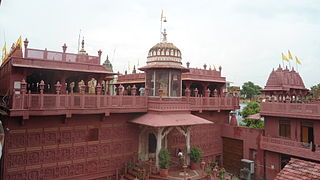
Shri Digamber Jain Atishya Kshetra Mandir, Sanghiji is an ancient Jain Temple in Sanganer, Rajasthan made of red stone. The ancient Shri Digamber Jain temple of Sanganer is 16 km from Jaipur.

The Samadhishvara Temple is a Hindu temple located in the Chittor Fort in Rajasthan, India. It is dedicated to Shiva, who is called "Samadhishvara", that is, "Lord of Samadhi". Epigraphic evidence suggests that the temple was constructed in the 11th century, and was further restored in the 13th and the 15th centuries.

Kesariyaji Tirth or Rishabhdeo Jain temple is a Jain temple located in Rishabhdeo town of Udaipur District of Indian state of Rajasthan. The temple is considered an important pilgrimage center by both Digambara and Śvētāmbara sect of Jainism.




















